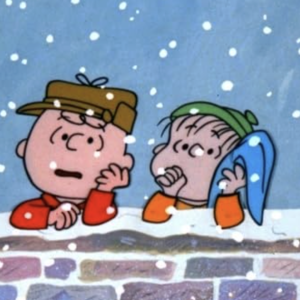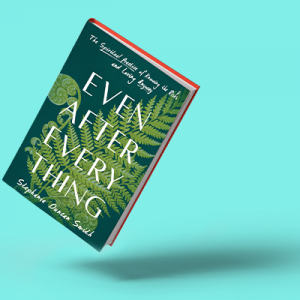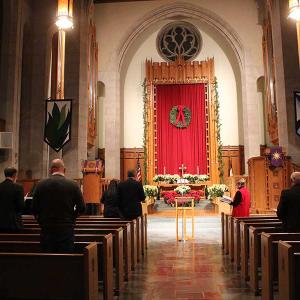
Whatever the cause, grief can be especially lonely in a season fixated on “merry and bright.” These articles don't try to take away the pain, but we hope they offer a small reminder that you're not alone.

So as we participate in Advent this month, the Old Testament story of Job may be a helpful text to explore. Job addresses the enigma of suffering head-on, mincing no words but also not really answering the question of why we suffer. Perhaps, though, the simple freedom to question God and mourn our losses is just what we need this Christmas.

Sufjan Stevens’ Songs for Christmas boxset includes a memoir essay about how the smell of a burning spatula sent him tumbling into old Christmas memories and, eventually, something like a spiritual revelation—“a tragic-comic-sentimental shock that was simultaneously mundane and supernatural.”
In the vision Stevens describes, the smell of melting plastic becomes a portal to the whole universe, past and present, and “at the very center of the universe I saw the Christ Child … This was the mysterious Incarnation of God. It feels about right that Stevens would treat Christmas like both a theological mystery and a craft-store accident.

Though Thanksgiving 2020 isn’t canceled—like just about everything else this past year—it needs to be different. Because of this, it is currently not safe to travel or gather in the ways many of us typically do. This need to do differently has left many Christians split and pitted against one another.

Everyone is supposed to love Christmas and the holidays. It’s supposed to be a time of family and gratitude. But I dread them. I dread the weeks leading up to Christmas, starting the day before Thanksgiving when Christmas carols begin permeating the radio and stores and build to a crescendo through Christmas Eve. The growing darkness in the absence of daylight saving time doesn’t help.
In ‘Even After Everything,’ Stephanie Duncan Smith shares her story of loss and love with unflinching honesty.

IF YOU WROTE down your past year’s most significant personal joys and losses on a timeline, how might they line up with the liturgical calendar — Advent, Christmas, Epiphany, Lent, Holy Week, Eastertide, and Ordinary Time? Placing these two calendars side by side, what might you find? Stephanie Duncan Smith digs into these questions in her memoir Even After Everything. For Duncan Smith — and likely for most of us — “Sometimes our personal moments converge with these natural and sacred seasons in profound, meaning-rich ways. And sometimes they clash with unbearable disparity.”
Duncan Smith shares her own story of loss and love with unflinching honesty, even and especially where it seems to clash with the Christian story. The places of dissonance are, for her, both a “dizzying problem” and a “place of divine encounter.” She invites us to dive into the dissonance with her as she wrestles out a sort of reconciliation — a renewed understanding of the Christian story that makes room, so much room, for every human grief. “The promise has never been smooth nor safe passage,” Duncan Smith writes. “The divine promise is presence.”
Our personal formation depends on how we hold grief and journey with it.

I RECENTLY HAD a conversation where I found myself feebly describing the pain of caring for an ill and aging parent. My wife, who is an exceptional curator of the emotional landscape, aptly identified my experience, my grief, as an “ache of the soul.” I find no better words for an experience so enveloping, so permeating through my body, my being, down to a cellular level — like a wave of loss that dredges the depths of the soul.
Grief can be complex and does not always begin with a terminal event. Surveyors of the human experience know well the “little” griefs that happen: the waning connection with the living; the loss of memory; the loss of energy and vitality. A once-doting parent who often inquired “Why haven’t you called?” no longer has the energy to do so. Meanwhile, whether relationships with our lost loved ones were good, complicated, or even nonexistent, the ache of the soul can be overwhelming.

“We’re all born to live, to love and to die,” he said. “Between the birth and the dying the question is what do we make of it?"
